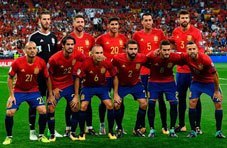Soccer is Spain’s national sport and easily the most loved sport in the country, sharing popularity with basketball and bullfighting. It was imported from the British Isles in the late 1900s and has been governed by the Royal Spanish Football Federation since 1909. Professional soccer in Spain is often viewed as a sociocultural event and is believed to be tied with politics, identity and attitudes towards regionalism in the country. Spanish soccer fans are enthusiastic, intense and passionate, and sometimes even fanatic in their cheering - certainly one of the most dedicated fan bases in Europe’s sport.
The Spain national soccer team made their international debut at the 1920 Olympic Games hosted in Belgium, winning the silver medal. The team is referred to as La selección (The Selection), La Roja (The Red One) or La Furia Roja (The Red Fury). Real Madrid and FC Barcelona are the two most famous Spanish soccer teams, celebrated all over the world.
3 Facts about the Team History
- International Success: Starting with the silver medal at the 1920 Summer Olympics, the Spain national soccer team has had many international achievements. In 1964 La Roja won the UEFA European Championship, was runner-up in the UEFA championship in 1984, won the Olympic gold in 1992, won silver at the 2000 Olympics, won the 2008 UEFA European Championship and won he FIFA World Cup for the first time (and only time, for now) in 2010. Spain’s national soccer team is the only team to have won an international event 3 times in a row: they’ve been victorious at at Euro 2008, the 2010 World Cup 2010, and Euro 2012.
- Style of Play: Characteristic for both the FC Barcelona and the national soccer team, the ‘tiki-taka’ style of play has become a recognisable feature of Spanish soccer teams. The signature ‘tiki-taka’ style focuses on maintaining possession of the ball and technical stability. The physical qualities of the player are not emphasised by this distinctive style of play, which arguably explains why most of the Spanish midfielders are petite in stature. Most notable features of ‘tiki-taka’ are quick movement, short passes, high possession percentage, emphasis on midfielders and rapid transition from defence to attack - it’s delivering that killer pass to score a goal that truly makes a difference.
- Team Records: Iker Casillas, considered by many to be one of the greatest and most successful goalkeepers of all time, holds the record for most appearances for La Furia Roja with 167 since 2000. He is followed by Sergio Ramos with 150 caps who became the nation's youngest player to ever reach 100 appearances. The top goalscorer for Spain is David Villa, having scored 59 goals from 2005 until March 2018 in a total of 98 performances.
3 Fun Facts about the Country
- Fiesta Country: Spain is renowned for its festivals and parties, with hundreds of fiestas taking place in the country throughout the year. Some of the weirdest festivals take place in Spain such as the Tomatina (‘tomato battle) in Buñol and San Fermín (‘running of the bulls’) in Pamplona. Las Fallas is also one of the most notable events, when huge ninots (cardboard, wood, and plaster statues) are burnt in Valencia.
- Christmas lottery: El Gordo or ‘the fat one’ is the name of the Spanish national lottery which takes place just before Christmas. It has the world’s largest payout of over 2 billion euros.
- The Oldest Restaurant in the World: According to the Guinness World Records, the oldest restaurant in the world is located in Spain’s capital, Madrid. It’s called Botín and has been open since 1725. The venue’s signature dish is roast suckling pig, or ‘Cochinillos asado’.




